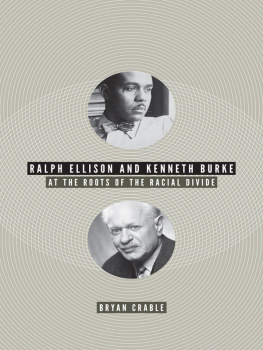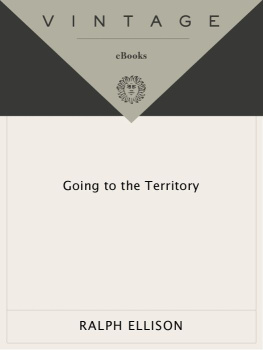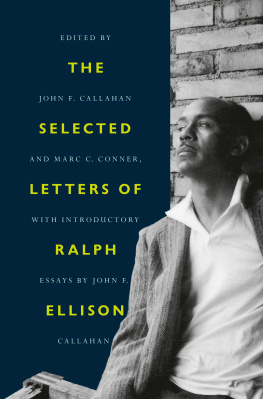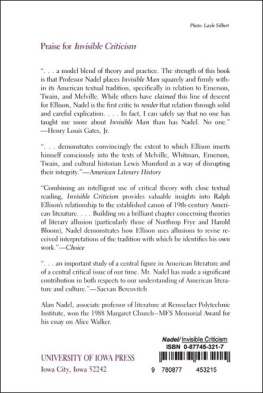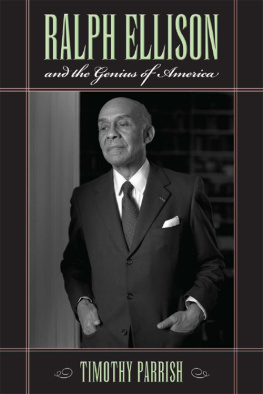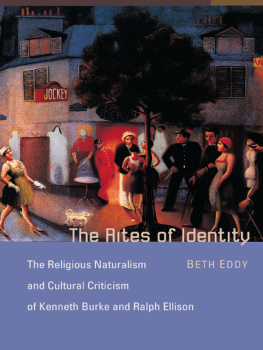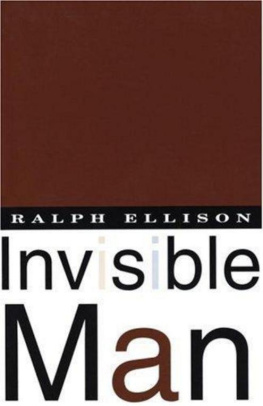
RALPH ELLISON AND KENNETH BURKE
RALPH ELLISON AND KENNETH BURKE
At the Roots of the Racial Divide
BRYAN CRABLE
University of Virginia Press
CHARLOTTESVILLE AND LONDON
University of Virginia Press
2012 by the Rector and Visitors of the University of Virginia
All rights reserved
Printed in the United States of America on acid-free paper
First published 2012
9 8 7 6 5 4 3 2 1
LIBRARY OF CONGRESS CATALOGING-IN-PUBLICATION DATA
Crable, Bryan, 1970
Ralph Ellison and Kenneth Burke : at the roots of the racial divide / Bryan Crable.
p. cm.
Includes bibliographical references and index.
ISBN 978-0-8139-3215-6 (cloth : alk. paper)
ISBN 978-0-8139-3216-3 (pbk. : alk. paper)
ISBN 978-0-8139-3217-0 (e-book)
1. Ellison, RalphCriticism and interpretation. 2. Burke, Kenneth, 18871993Criticism and interpretation. 3. Race awarenessUnited StatesHistory. 4. United StatesRace relationsHistory20th century. I. Title.
PS3555.L625Z634 2011
818'.5409dc23
2011023085

A book in the American Literatures Initiative (ALI), a collaborative publishing project of NYU Press, Fordham University Press, Rutgers University Press, Temple University Press, and the University of Virginia Press. The Initiative is supported by The Andrew W. Mellon Foundation. For more information, please visit www.americanliteratures.org.
Yo, Joy. To you.
CONTENTS
ACKNOWLEDGMENTS
Many events, large and small, conspired to help me write this book. (Unfortunately for me, I have surely forgotten many of them.) My parents were among the strongest influences on my choice of vocation, both as a teacher and as a scholar. Both are writers, and both spent decades teaching, at the college (dad) and secondary (mom) level. They also first connected me to Kenneth Burke. Burke was central to my fathers dissertation, and so, as the story goes, when I was a toddler the family camped in Florida so that my father could interview Burke. At one point during this trip, Malcolm Cowleys wife, Muriel, taught me the word moon (she did a good job; I havent forgotten it). This early association prepared me to study Burkes work in earnest.
I have my parents to thank for another vital contribution to this book. Though I grew up in the Midwestand in locales that were more homogeneous in population than notmy early experiences were reflective of our American diversity. Since my earliest playmates and friends formed a veritable Rainbow Coalition, I had a different experience of race than many white peerssomething I found out in seventh grade when our social studies teacher gave a portion of one class to the telling of antiblack jokes. This is not to say that I grew up innocent of race or racism. But I did grow up differently than many of my peers, and I do have my parents to thank for that.
This particular project, however, has its specific genesis in more recent history. During my second year at Villanova, my department chair (and friend) Terry Nance encouraged me to participate in an interdisciplinary, team-taught institute in our honors program. We even hit upon a title: Race, Rhetoric, and the Reality of Racism. After receiving the blessing of the director of the program, Edwin Goff, I collaborated with four colleagues on the design of and readings for the nine-credit course. I can honestly say that without this intensive semester alongside them, I would not be the thinker, or the person, I am today. This book and I owe an immense debt to them: Maghan Keita, Kevin Miles, Crystal Lucky, and Carol Anthony.
Further, during that semester, Crystal assigned Ralph Ellisons Change the Joke and Slip the Yoke in preparation for a lecture by Kimberly Benston. Reading these pages, I was hookedand struck by the Burkean flavor of the essay. When I mentioned this to Crystal and Benston, I first learned of the personal and intellectual connection between Burke and Ellison.
This news arrived at a critical time. My junior sabbatical was to follow on the heels of that semester, and I was searching for a project. Joy Cypher (about whom more later) made a suggestionWhy dont you make this the subject of your sabbatical?that was truly the genesis for this book. In addition to this valuable sabbatical time, along the way I have also benefited immensely from two Strategic Communication Research Grants from the Graduate Programs of Villanovas Department of Communication. Ten years later, I feel that I have finally been able to do this relationship, and these two men, justice.
I also, of course, have other debts to acknowledge. I still reap the benefits of the education I received at Purdue University, especially under the tutelage of Calvin Schrag, Martin Matustik, and Lewis R. Gordon. Without the education that they provided me in existential phenomenology and its roots, I would not read Burke the way that I do. William K. Rawlins also was generous in agreeing to provide an independent study on Burke when I was turned away by others. Robert Wade Kenny, although not at Purdue, not only agreed to be on my doctoral committee, but was also my most challenging reader. My interpretation of Burke is heavily indebted to him.
Calvin Schrag insists that we, as professors, learn more from our students than we ever acknowledge. Thus, I would like to thank the students with whom these ideas (in one form or another) were discussed. That includes the fifteen students of the Race Institute, and especially Dr. Jasmine Cobb, who has been a source of conversation upon matters of race since 2001. (I still reflect upon her insightful senior thesis, a Goffmanean view of racial passing.) I am also thankful to the students in my 2004 honors seminar on Burke and Ellison, where I worked out early versions of these ideasand especially Erin Arizzi, who used the course to work out a few ideas of her own regarding the bureaucratization of the imaginative. Finally, the Spring 2010 students of Rhetoric, Identity, and Conflict were quite tolerant when I wove drafts of my chapters into course topics.
I have also been given several opportunities, over the years, to present material on the Burke-Ellison relationship. Many of these have transpired thanks to Jack Selzer, whom I met during my first visit to the Kenneth Burke Papers at Penn State. Jack has been a wonderful mentor and source of friendship. He assisted me in the archives and asked me to give a featured address at the 2005 Kenneth Burke Society Triennial Conference, an experience that led to my essays inclusion in his edited volume, Kenneth Burke and His Circles. Since I also draw heavily upon his two books on Burke, I owe him a great deal. I have others to thank at Penn State, of course; Keith Gilyard and Robin Schulze were generous with an invitation to a daylong symposium on Ellison and his work. They, and the other participants, were very helpful in pushing me to incorporate more Ellisonian elements into my habitually Burkean perspective.
I have to also thank those whose labor helped make this book possible. Nathan Taylor was an able research assistant, and his slogging made my own more bearable. Leah Jehan of the Beinecke Rare Book and Manuscript Library at Yale University was quick to respond to a long-distance request for a letter housed in the Richard Wright Papers. Dr. Alice Birney and the Library of Congress staff were immensely helpful during my visits to D.C. Jeannette Sabre and Sandra Stelts from the Penn State Special Collections staff are angels. I am also thankful to Phoebe Pettingell for her interest in my work, and her willingness to let me quote from the Stanley Edgar Hyman Papers. John F. Callahan, similarly, in his role as literary executor for Ralph Ellison, has been more than generous. He gave me access to the Ellison Papers at a time when few were granted such access. I will never forget his encouragement and his willingness to take a chance on a young scholar. I am likewise immensely grateful to the Ralph and Fanny Ellison Foundation for its support and permission to quote from the Ellison Papers.
Next page
